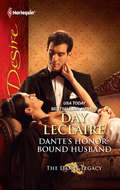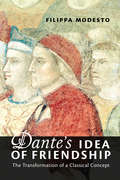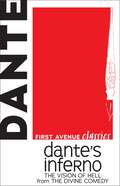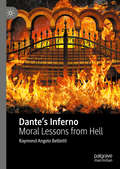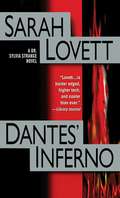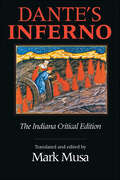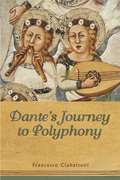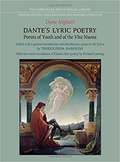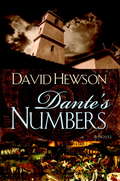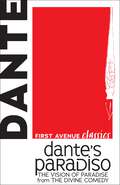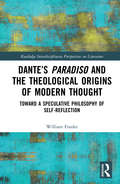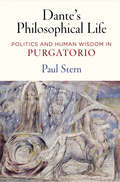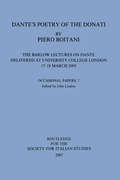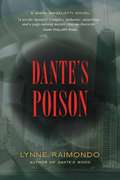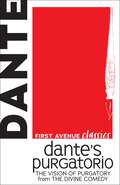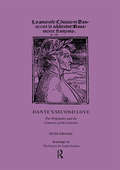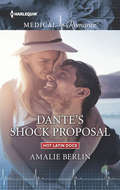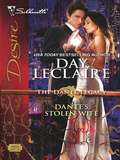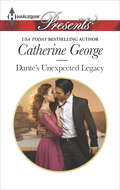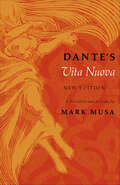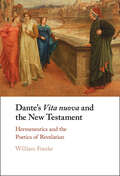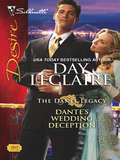- Table View
- List View
Dante's Honor-Bound Husband
by Day LeclaireIn the Dante family, one touch was all it took. The heat shared between Constantine Romano and Gianna Dante would not be ignored-even though Constantine left town nearly two years ago! But now he was back and Gianna was about to teach him that a Dante was not to be ignored.... The Italian businessman didn't anticipate this lovely Dante getting under his skin-but he wouldn't let anyone else have her, either! Whether or not he believed in the legend of the Inferno, Constantine knew that Gianna was going to be his by whatever means possible. And his brand of persuasion would be oh-so-passionate!
Dante's Idea of Friendship
by Filippa ModestoIn the ancient world, friendship was a virtue of great philosophical importance. Aristotle wrote extensively about it, as did Cicero. Their conception of friendship as a relationship based on reason and virtue was transformed by Christianity into a connection based on the mutual love of an individual and God.In Dante's Idea of Friendship, Filippa Modesto offers sharp readings of the Commedia, Vita Nuova, and Convivio that demonstrate Dante's interest in that theme. Drawing on a lucid and wide-ranging examination of the literature on friendship, she shows how he weaved together the contradictory classical and the Christian concepts of friendship into a harmonious synthesis in which friendship became a handmaiden to salvation and happiness. A fresh, perceptive interpretation of Dante's works, Dante's Idea of Friendship will engage medievalists, classicists, and scholars of friendship throughout the ages.
Dante's Inferno: The Vision of Hell from The Divine Comedy (First Avenue Classics ™ #Vol. 1)
by Dante AlighieriInferno is the first part of Italian poet Dante Alighieri's epic poem Divine Comedy. The allegory describes Dante's journey through the depths of Hell. He is led by the Roman poet Virgil down into the nine circles of Hell, each of which holds and punishes progressively worse sinners. From the First Circle, where unbaptized souls live in peaceful limbo, down to the Ninth Circle, where Satan is trapped in ice, Dante sees firsthand the consequence of unrepentantly sinning against God. Dante published his narrative poem between 1308 and 1321. This version is taken from an 1892 English edition, featuring British author Rev. H. F. Cary's blank verse translation and woodcut illustrations by French artist Gustave Doré.
Dante’s Inferno: Moral Lessons from Hell
by Raymond Angelo BelliottiThis book provides a recipe for healthy moral and personal transformation. Belliotti takes seriously Dante’s deepest yearnings: to guide human well-being; to elevate social and political communities; to remedy the poisons spewed by the seven capital vices; and to celebrate the connections between human self-interest, virtuous living, and spiritual salvation. By closely examining and analyzing five of Dante’s more vivid characters in hell—Piero della Vigna, Brunetto Latini, Farinata degli Uberti, Cavalcante de’ Cavalcanti, and Guido da Montefeltro—and extracting the moral lessons Dante intends them to convey, and by conceptually analyzing envy, arrogance, pride, and human flourishing, the author challenges readers to interrogate and refine their modes of living.
Dantes' Inferno: A Dr. Sylvia Strange Novel
by Sarah LovettThe author of the critically acclaimed novels Dangerous Attachments and Acquired Motives is back with another spellbindingly original thriller featuring forensic psychiatrist Sylvia Strange. Now, in Dantes' Inferno, Sylvia is called to Los Angeles from her New Mexico home when a massive explosion blasts through the J. Paul Getty Museum, endangering children on a field trip and claiming two lives. The police peg notorious bomber John Dantes as the mastermind, even though he's in a maximum-security prison, serving a life sentence for another bombing he claims he didn't commit. Dr. Strange, a genius at accessing the most tortured psychiatric cases, is called in to evaluate Dantes. The prisoner is said to be unreachable -- and renowned for psychologically terrorizing his every visitor. But Dr. Strange forms a sudden, and unsettling, connection with Dantes. There's something about the enigmatic loner and his obsession with Los Angeles that both confounds and unnerves her. She's not at all convinced he's the man behind the bombs now ripping through the city -- but she is convinced he holds the key to finding the real bomber. The problem remains: how to get at Dantes? The police department's drug-and-interrogation campaign effectively stupefies the patient, and Dr. Strange's inability to "get results" troubles her deeply pragmatic supervisor, who in turn challenges her approach, her ability, and her intuition. As the death toll rises, so does public outcry, and sanctions against the fully demonized prisoner are further tightened. With the clock ticking on a bomb promised to be of epic proportions, Dr. Strange's sovereignty over her patient is slipping away -- along with, seemingly, her sanity. Dantes' Inferno is a hypnotic, heart-pounding journey to the soul of madness that reveals disturbing and darkly universal truths about human nature. It is Sarah Lovett's best thriller yet.
Dantes' Inferno
by Sarah LovettThe author of the critically acclaimed novels Dangerous Attachments and Acquired Motives is back with another spellbindingly original thriller featuring forensic psychiatrist Sylvia Strange. Now, in Dantes' Inferno, Sylvia is called to Los Angeles from her New Mexico home when a massive explosion blasts through the J. Paul Getty Museum, endangering children on a field trip and claiming two lives. The police peg notorious bomber John Dantes as the mastermind, even though he's in a maximum-security prison, serving a life sentence for another bombing he claims he didn't commit. Dr. Strange, a genius at accessing the most tortured psychiatric cases, is called in to evaluate Dantes. The prisoner is said to be unreachable -- and renowned for psychologically terrorizing his every visitor. But Dr. Strange forms a sudden, and unsettling, connection with Dantes. There's something about the enigmatic loner and his obsession with Los Angeles that both confounds and unnerves her. She's not at all convinced he's the man behind the bombs now ripping through the city -- but she is convinced he holds the key to finding the real bomber. The problem remains: how to get at Dantes? The police department's drug-and-interrogation campaign effectively stupefies the patient, and Dr. Strange's inability to "get results" troubles her deeply pragmatic supervisor, who in turn challenges her approach, her ability, and her intuition. As the death toll rises, so does public outcry, and sanctions against the fully demonized prisoner are further tightened. With the clock ticking on a bomb promised to be of epic proportions, Dr. Strange's sovereignty over her patient is slipping away -- along with, seemingly, her sanity. Dantes' Inferno is a hypnotic, heart-pounding journey to the soul of madness that reveals disturbing and darkly universal truths about human nature. It is Sarah Lovett's best thriller yet.
Dante's Inferno, The Indiana Critical Edition (Indiana Masterpiece Editions)
by Dante AlighieriThis new critical edition, including Mark Musa's classic translation, provides students with a clear, readable verse translation accompanied by ten innovative interpretations of Dante's masterpiece.
Dante's Journey to Polyphony
by Francesco CiabattoniIn Dante's Journey to Polyphony, Francesco Ciabattoni's erudite analysis sheds light on Dante's use of music in the Divine Comedy. Following the work's musical evolution, Ciabattoni moves from the cacophony of Inferno through the monophony of Purgatory, to the polyphony of Paradise and argues that Dante's use of sacred songs constitutes a thoroughly planned system. Particular types of music accompany the pilgrim's itinerary and reflect medieval theories regarding sound and the sacred. Combining musicological and philological scholarship, this book analyzes Dante's use of music in conjunction with the form and content of his verse, resulting in a cross-discipline analysis also touching on Italian Studies, Medieval Studies, and Cultural History. After moving from infernal din to heavenly harmony, Ciabattoni's final section addresses the music of the spheres, a theory that enjoyed great diffusion among the early middle ages, inspiring poets and philosophers for centuries.
Dante's Lyric Poetry: Poems of Youth and of the 'Vita Nuova' (Lorenzo Da Ponte Italian Library)
by Richard Lansing Teodolinda Barolini Andrew FrisardiThe first comprehensive English translation and commentary on Dante's early verse to be published in almost fifty years, Dante's Lyric Poetry includes all the poems written by the young Dante Aligheri between c. 1283 and c. 1292. Essays by Teodolinda Barolini guide the reader through the new verse translations by Richard Lansing, illuminating Dante's transformation from a young courtly poet into the writer of the vast and visionary Commedia.Barolini's commentary exposes Dante's lyric poems as early articulations of many of the ideas in the Commedia, including the philosophy and psychology of desire and its role as motor of all human activity, the quest for vision and transcendence, the frustrating search for justice on earth, and the transgression of boundaries in society and poetry. A wide-ranging and intelligent examination of one of the most important poets in the Western tradition, this book will be of interest to scholars and poetry-lovers alike.
Dante's Numbers (Nic Costa #7)
by David HewsonAllan Prime's eyes were as large as any man's Peroni had ever seen. He looked ready to die of fright, even before the bright, shining spear with the blood-soaked tip reached his head . The death mask of the poet Dante is to be exhibited at the premiere of a controversial film, Inferno, based on his epic work. But at the grand unveiling this priceless artefact is replaced by a macabre death mask of the film's star, Allen Prime. And minutes later, the leading actress, Maggie Flavier, is threatened before her attacker is shot. After footage of Primeâ s murder is shown over the internet, the Carabinieri are determined to take over the investigation, certain that a crazed Dante fan is behind the killing. Nic Costa and his team follow the movie to its next showing in San Francisco, to safeguard the remaining items and hoping to recover the stolen death mask. However, in California the mystery deepens, with confusing new clues about the deaths in Rome. With the Carabinieri and local authorities distracted by false leads, can Costa protect Maggie, find the truth and stop the killer -- all before life imitates art?
Dante's Paradiso: The Vision of Paradise from The Divine Comedy (First Avenue Classics ™)
by Dante AlighieriParadiso is the third and final part of Italian poet Dante Alighieri's epic poem Divine Comedy and describes Dante's journey through heaven. He is now led by Beatrice, who joined him at the end of Purgatorio. Beatrice takes Dante into the nine celestial spheres of Heaven. From the First Sphere, where they find those who were good but did not keep their vows, to the Ninth Sphere and the Empyrean, the home of the angels and God, Dante experiences the blessings given to those who live a life faithful to God. Dante wrote his narrative poem between 1308 and 1321. This version is taken from a 1901 English edition, featuring British author Rev. H. F. Cary's blank verse translation and woodcut illustrations by French artist Gustave Doré.
Dante’s Paradiso and the Theological Origins of Modern Thought: Toward a Speculative Philosophy of Self-Reflection (Routledge Interdisciplinary Perspectives on Literature)
by William FrankeSelf-reflection, as the hallmark of the modern age, originates more profoundly with Dante than with Descartes. This book rewrites modern intellectual history, taking Dante’s lyrical language in Paradiso as enacting a Trinitarian self-reflexivity that gives a theological spin to the birth of the modern subject already with the Troubadours. The ever more intense self-reflexivity that has led to our contemporary secular world and its technological apocalypse can lead also to the poetic vision of other worlds such as those experienced by Dante. Facing the same nominalist crisis as Duns Scotus, his exact contemporary and the precursor of scientific method, Dante’s thought and work indicate an alternative modernity along the path not taken. This other way shows up in Nicholas of Cusa’s conjectural science and in Giambattista Vico’s new science of imagination as alternatives to the exclusive reign of positive empirical science. In continuity with Dante’s vision, they contribute to a reappropriation of self-reflection for the humanities.
Dante's Philosophical Life: Politics and Human Wisdom in "Purgatorio"
by Paul SternWhen political theorists teach the history of political philosophy, they typically skip from the ancient Greeks and Cicero to Augustine in the fifth century and Thomas Aquinas in the thirteenth, and then on to the origins of modernity with Machiavelli and beyond. Paul Stern aims to change this settled narrative and makes a powerful case for treating Dante Alighieri, arguably the greatest poet of medieval Christendom, as a political philosopher of the first rank.In Dante's Philosophical Life, Stern argues that Purgatorio's depiction of the ascent to Earthly Paradise, that is, the summit of Mount Purgatory, was intended to give instruction on how to live the philosophic life, understood in its classical form as "love of wisdom." As an object of love, however, wisdom must be sought by the human soul, rather than possessed. But before the search can be undertaken, the soul needs to consider from where it begins: its nature and its good. In Stern's interpretation of Purgatorio, Dante's intense concern for political life follows from this need, for it is law that supplies the notions of good that shape the soul's understanding and it is law, especially its limits, that provides the most evident display of the soul's enduring hopes.According to Stern, Dante places inquiry regarding human nature and its good at the heart of philosophic investigation, thereby rehabilitating the highest form of reasoned judgment or prudence. Philosophy thus understood is neither a body of doctrines easily situated in a Christian framework nor a set of intellectual tools best used for predetermined theological ends, but a way of life. Stern's claim that Dante was arguing for prudence against dogmatisms of every kind addresses a question of contemporary concern: whether reason can guide a life.
Dante's Poetry of Donati: The Barlow Lectures on Dante Delivered at University College London, 17-18 March 2005
by Piero Boitani"Members of the Florentine family of the Donati feature prominently in Dante's Divine Comedy . Their presence is explored by Piero Boitani, as a 'comedy' within the Comedy, in close readings of the three major episodes in which they appear, one for each of Inferno , Purgatorio , and Paradiso ."
Dante's Poison: A Mark Angelotti Novel (Mark Angelotti)
by Lynne RaimondoBlind psychiatrist Mark Angelotti has just enrolled in a drug trial that holds out hope of restoring his eyesight when he again becomes entangled in a case that is rocking the Chicago legal community. After defending the manufacturer of the powerful antipsychotic drug Lucitrol against product-liability claims, attorney Jane Barrett has become somewhat of an expert on the controversial medication. So when her lover, investigative journalist Rory Gallagher, collapses from a fatal dose of the same drug, it falls to Hallie Sanchez, Barrett's oldest friend, to defend her on murder charges. Amid growing doubts about her friend's innocence, Hallie recruits Mark Angelotti to help her discredit the testimony of a crucial eyewitness. The pair succeeds in obtaining Barrett's release, but at a dreadful price. Mark sets out to investigate who else may have wanted the journalist out of the way. As he gets closer to the truth, he realizes the killer is still on the loose. But two questions remain for Mark: Will the drug trial succeed in restoring his eyesight? More important, will he live long enough to see this case to its end?From the Trade Paperback edition.
Dante's Purgatorio: The Vision of Purgatory from The Divine Comedy (First Avenue Classics ™)
by Dante AlighieriPurgatorio is the second part of Italian poet Dante Alighieri's epic poem Divine Comedy and describes Dante's climb up the Mount of Purgatory. As in the Inferno, the Roman poet Virgil is guiding Dante on a journey; this time they visit the seven terraces of Purgatory, where sinners are cleansing themselves in preparation for entering Paradise. Each of the terraces represents one of the seven deadly sins, ranging from pride to lust. Through this allegory, Dante conveys that repentant souls can be redeemed. Dante wrote his narrative poem between 1308 and 1321. This version is taken from a 1901 English edition, featuring British author Rev. H. F. Cary's blank verse translation and woodcut illustrations by French artist Gustave Doré.
Dante's Second Love: The Originality and the Contexts of the Convivio
by Peter Dronke"Three essays on the nature of the bonds between Vita Nuova and Convivio; the nature and significance of the Donna Gentile, Dante's 'second love'; and the imaginative and intellectual coherence of the third and fourth treatises of the Convivio . An excursus comments on the Donna Gentile's fate at the hands of scholars."
Dante's Shock Proposal
by Amalie BerlinAn inconvenient desire Growing up in the midst of her parents' fraught union, surgical nurse Lise Bradshaw has never wanted nor needed a man by her side. Until a sensual chance encounter with Dr. Dante Valentino on the dance floor of a Miami club sparks a full-blown passionate affair...leading to a shock proposal! Dante knows what he wants-a family-and what he doesn't-love. But as the fire blazes between him and beautiful Lise he realizes that he's inconveniently falling for his convenient fiancée!
Dante's Stolen Wife
by Day LeclaireThey called it The Inferno--the all-consuming desire that scorched a man just once in a lifetime. Millionaire Marco Dante felt its flames the moment he set eyes on Caitlyn Vaughn. Nothing could keep him from having her--not even her engagement to his twin brother! So he posed as her true fiancé, stealing her away for a rushed wedding and a breathtaking honeymoon. But then he had to face his new bride when she discovered his masquerade--and somehow find a way to turn her blazing fury back into white-hot passion. . . .
Dante's Tenzone with Forese Donati
by Fabian Alfie'And by now, mind, it's too late to redeem your debts by giving up guzzling.' Dante's poetic correspondence (or tenzone) with Forese Donati, a relative of his wife, was rife with crude insults: the two men derided one another on topics ranging from sexual dysfunction and cowardice to poverty and thievery. But in his Commedia, rather than denying this correspondence, Dante repeatedly acknowledged and evoked the memory of his youthful put-downs.Dante's Tenzone with Forese Donati examines the lasting impact of these sonnets on Dante's writings and Italian literary culture, notably in the work of Giovanni Boccaccio. Fabian Alfie expands on derision as an ethical dimension of medieval literature, both facilitating the reprehension of vice and encouraging ongoing debates about the true nature of nobility. Outlining a broad perspective on the uses of literary insult, Dante's Tenzone with Forese Donati also provides an evocative glimpse of Dante's day-to-day life in the twelfth century.
Dante's Twins (Expecting!)
by Catherine SpencerThe boss, his bride...and their babies!Leila wasn't marrying her boss, Dante Rossi, for his money, contrary to office gossip. She loved him and she believed he felt the same...until the reappearance of her millionaire ex-boyfriend. Suddenly it wasn't just jealous colleagues who believed she was a gold digger-so did Dante!Only the unexpected news of her pregnancy stopped him from calling off the wedding. But Leila wished Dante was marrying because he loved her, not just because she was the mother of his unborn twins....She's sexy, she's successful...and she's PREGNANT!
Dante's Unexpected Legacy (One Night With Consequences)
by Catherine GeorgeAn Italian tycoon is determined to marry the woman he seduced years ago—and claim the child he never knew he had—in this international romance.The night that Rose Palmer met the rich, sexy and enigmatic Dante Fortinari, she threw caution to the wind—allowing him to sweep her off her feet and into his bed! But by the next morning Dante was gone, leaving Rose heartbroken, alone . . . and pregnant.Two years later, Rose comes face-to-face with the father of her daughter and can no longer hide the truth of that night. She knew he’d be angry, but never expected him to demand marriage! She longs to accept, but can her heart withstand life with a man who might never love her back?
Dante's Vita Nuova: A Translation and an Essay
by Dante AlighieriIn this new edition Musa views Dante's intention as one of cruel and comic commentary on the shallowness and self-pity of his protagonist, who only occasionally glimpses the true nature of love. ". . . the explication de texte which accompanies [Musa's] translation is instructively novel, always admirable. . . . This present work offers English readers a lengthy appraisal which should figure in future scholarly discussions." —Choice
Dante's Vita Nuova and the New Testament: Hermeneutics and the Poetics of Revelation
by William FrankeModelling knowledge as revelation and theology as poetry, this powerful new reading of the Vita nuova not only challenges Dante scholars to reconsider the book's speculative emphases but also offers the general reader an accessible yet penetrating exploration of some of the Western tradition's most far-reaching ideas surrounding love and knowledge. Dante's 'little book', included in full here in an original parallel translation, captures in its first emergence the same revolutionary ferment that would later become manifest both in the larger oeuvre of this great European writer and in the literature of the entire Western canon. William Franke demonstrates how Dante's youthful poetic autobiography disrupts sectarian thinking and reconciles the seeming contraries of divine revelation and human invention, while also providing the means for understanding religious revelation in the Bible. Ultimately, this revolutionary unification of Scripture and poetry shows the intimate working of love at the source of inspired knowing.
Dante's Wedding Deception
by Day LeclaireNothing could keep Nicolò Dante from uncovering the truth about Kiley O'Dell. He knew she had to be a liar, but the moment he set eyes on the beauty, his soul was scorched by the once-in-a-lifetime heat of The Dante Inferno. Then a sudden accident stole her memory, and he seized the chance to learn all her deepest secrets-- by pretending to be her husband. But the longer he kept up the dangerous masquerade, the clearer it became that whoever this woman was--whatever she was--he couldn't rest until he made her truly his own. . . .
